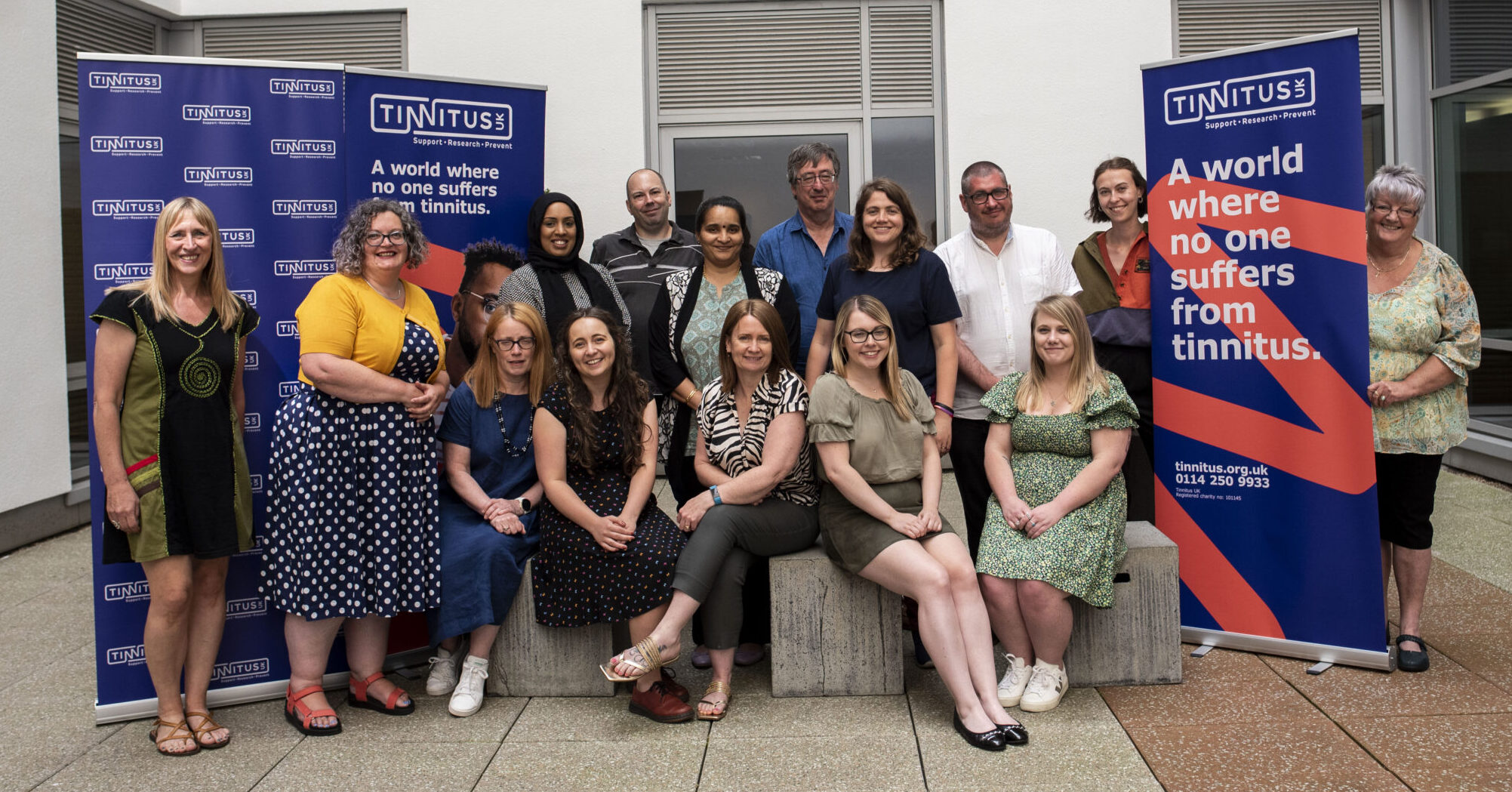My partner has tinnitus
Information on how you can understand and support your partner with their tinnitus
Tinnitus is the sensation of hearing a sound when there is no external source for that sound. It is very common. Around one in seven have it, that’s about 14% of adults in the UK.
Tinnitus is often called a ‘symptom’ rather than an illness. Fortunately, it is rarely a sign of a serious physical problem. It is advisable to consult a GP, though, just to rule this out.
Most people live with tinnitus and don’t really notice it. For others, the sound can be difficult to manage. Around one in seven people with tinnitus describe it as ‘severe’ and that it makes a significant impact on their quality of life. This is where understanding and support from family and friends can make a big difference.
What does tinnitus sound like?
Everyone’s tinnitus is different. Many people hear a ringing sound, but others hear whistling, buzzing or crackling. There are many different experiences and, like fingerprints, there are endless variations. The noise may be heard in one ear, in both ears or in the middle of the head or it may be difficult to pinpoint its exact location. The noise may be low, medium or high pitched. There may be a single noise or two or more components. The noise may be continuous or it may come and go. It can be quiet or very loud, or the volume may fluctuate.

Tinnitus is sometimes a difficult condition to learn to live with. It often causes anxiety. Anxiety, in turn, often makes the experience of tinnitus worse.
Many people with tinnitus feel isolated because they can’t share the struggle of dealing with the overwhelming presence of sounds they can’t control. Often, people feel that others cannot understand what they are going through as they haven’t experienced it for themselves.
Some people describe their condition as tiring or even exhausting. In the first months especially, people can feel they are fighting a constant battle.
If your partner has recently started to experience tinnitus, you may notice some changes in their behaviour.
Tinnitus can draw people inwards as their attention is constantly being diverted to notice the sounds inside them. This can affect their concentration and mean that everyday tasks take longer than usual to complete. They may also become short-tempered, withdrawn or distracted.
It is very natural for people to have fears about living with tinnitus, and these worries can also affect their behaviour. Although most people do get used to or habituate to tinnitus over time – meaning that their brain learns to process the noise as background noise so that it seems less intrusive – it can be difficult to imagine getting to that point.
Your partner will benefit from your patience and understanding as they adjust. Show that you understand that what they are going through may be causing them problems.
Ask them if there are practical things you can do to help. For example, some people find loud or echoey environments difficult but don’t want to be the person in a group to suggest a different meeting place or activity. Other people find quiet environments tricky where there is more focus on the sound of their tinnitus. Your support in backing up whatever option makes things easier for them can be a big relief.
People may search for patterns in their tinnitus, looking for triggers. This can be a positive thing and can lead to a healthy change (such as getting a good night’s sleep). They may need your help in making these changes.
The search for triggers can sometimes take over and it can feel like tinnitus is controlling them. Your support could help them get the right balance. You could use these questions to help them think about what’s happening:
- Have you started to avoid things you previously enjoyed?
- Has this increased your frustration and anxiety about tinnitus?
- Are there healthier changes you can make to your lifestyle?
Try to support them to make a balanced decision about any lifestyle changes rather than one based on their fears and worries.
As a partner being open-minded to change can make a big difference. For example, if you sleep in the same room as the person with tinnitus, can you help to find some form of sound therapy which works for you both. If machines which play sound to the room disturb you, you could suggest pillows where the sound is localised so it is only heard by the person lying on it.
If both of you enjoy music or going to loud places, perhaps you could join them in wearing earplugs. This will help to protect your own hearing and make them feel less like the odd one out.
Another helpful thing to do is to encourage the person to get a diagnosis from their GP if they haven’t done this, or to encourage them to go back to see their clinician if their tinnitus has changed significantly. Likewise, encouraging a positive approach to recommended treatments is important. For example, if the tinnitus is accompanied by a hearing loss and a hearing aid is recommended, your support can go a long way to help the person take the plunge to try one and to persevere with the initial adjustment process.
You will be in the best state to support your partner when you are well yourself. Make sure you are making time for yourself and your own interests from week to week, and take care to eat and rest well.
It’s important to recognise, without blame, that your own well-being can be influenced by your partner’s experiences of tinnitus, and to talk openly about how to manage this. For example, just as you can be patient with your partner’s fears or anxieties, they can be patient with you if your own frustrations surface. You may find it helpful to set some ground rules about the way you discuss and approach issues to do with tinnitus.
If tensions become difficult to manage, consider seeing a counsellor together. Many couples find this a helpful support through difficult times.
Help and support
There is lots of help and support available for you and your partner.
You could share information from our website with them or look for a support group in your area. Often, attending a support group can be as helpful for you as it can for your partner with tinnitus, offering a chance to talk things through with people who understand what you’re going through. There are over 100 independent tinnitus support groups around the UK as well as a number who meet online. All welcome family and friends of people living with tinnitus.
You may also find it helpful to speak to our Tinnitus Support Team. You can reach them Mon-Fri, 9am-5pm on any of the below:
- Telephone: 0800 018 0527
- Web chat: click on the icon
- Email: helpline@tinnitus.org.uk
- Text/SMS: 07537 416841
Want to learn more?
We have a library of webinars on various elements of tinnitus which are available to purchase. Our webinars include a presentation from a guest speaker and Q & A with the audience. Please note that all webinars are recordings and you will receive a link to watch this on-demand.
Help keep this support free
Please give what you can to keep this advice and information free and available to everyone who needs it.
Donate today
